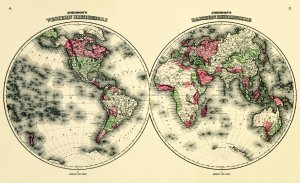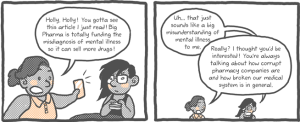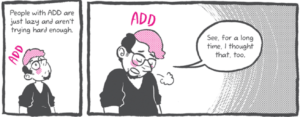
Source: Trend Kid
As if I didn’t get enough of it at the local queer club the other night, it’s time to poke some bears.
All sorts of arguments are being flung back and forth across the Internet about this whole usage of the term “cis gender” for—you know — cisgender people. The bulk of the resistance is from the cisgender community, which feels the usage of the term is oppressive. Or reverse transphobic. Or a war against cis people. Or something.
What the hell does “cisgender” mean, you ask? It’s pretty much the polite way of saying “not transgender.”
Now you’re all caught up — and pretty certain on which side of this argument I reside. In fact, the above statement tends to be the Readers Digest version of my whole spiel. It’s polite to say “cis” instead of “not trans.” The end.
But if that’s not convincing enough for you, here are six reasons why using the c-word is all about helping trans people and not at all about making cis people feel like shit.
1. It’s a Form of Realistic Classification
Let’s use the analogy of a lollipop. I really like lollipops.
Me: Well, hey there, best friend ever! Is that a lollipop on which you’re so enjoyably sucking?
You: Yup.
Me: May I ask flavor it is, my most loyal and esteemed companion?
You: Red.
Your explanation tells me something, but not much. It just doesn’t quite hit the mark on what I’d been asking. When I’m told the flavor is red, I do indeed have a good idea of the artificial flavor of red. But I still don’t know if that red flavor is specifically meant to be cherry, strawberry, raspberry, watermelon, pomegranate, cinnamon, fruit punch, berry blend…
Basically, there are a lot of ways to be red. Just like there are a lot of ways to be male, female, intersex, or gender non-conforming.
By using “cis woman” with “trans woman” as opposed to “trans woman” and just plain “woman,” we’re spreading the message that said trans woman isn’t abnormal. There is no Other and no One True Woman. Instead, said trans woman is just as much a woman as any cis woman.
Whoa. Back up.
Aren’t some of the life experiences of a cis woman different from that of a trans woman?
Of course they are. But so are the life experiences of, say, a cis woman who is a survivor of sexual violence as opposed to a cis woman who isn’t. Or one who grew up in utter poverty instead of getting a pony on her sweet sixteen. Some of us were dealt a rougher hand in places, you know?
Cis women as a whole may have it tough in some arenas, while trans women may have it tough in other arenas. Sometimes those arenas overlap. Recognize it, respect it, and move along.
2. It Recognizes Differences without Creating a Rift
I’m going to water this one down and compare testosterone-using transsexual men with cis men who produce a cis-level of testosterone on their own. (See what I did there?!)
Now, indeed, there are still differences.
One group may be more susceptible to breast cancer; one may not. One will most likely end up dealing with andropause later in life; the other probably will never have to. One needs to bend over once a year for a gloved doctor; the other may still need to spread his legs.
But despite these differences, both groups have the same range of testosterone running through their veins, meaning they carry the same medical worries for heart disease, heart attacks, high cholesterol, high blood pressure, hair loss, stomach fat, sleep apnea…
Even our pre-ejaculate ends up with strikingly similar properties despite any ongoing differences in our genitalia. Wee!
But medical analyses aside, trans people and cis people still just aren’t all that different. Trans people aren’t super-special for moving from one space to another, and cis people aren’t super-special for staying put.
By using “cis” in an everyday manner instead of leaving that section blank, you’re making a polite proclamation that you recognize yourself (and other cis people) as no more or less normal than trans people. You recognize that we’re simply subspecies of one another, not freaking Godzilla versus Mothra.
3. It Encourages Cis People to Check Their Privilege
Did you just hear that? That was a collective groan from the mainstream. Check your privilege, yeah yeah yeah. Can’t we think of anything new to tell you to do?
But we keep bringing it up because, well, it’s true. And it’s important.
The cultural issue with cis people is they are deemed the normal ones. The default. The card carriers of the gender country club. And as much as I’m tempted to quote Groucho Marx on that one, I’ll do Basic Rights instead:
“So why do we say ‘cisgender’ instead of ‘non-transgender?’ Because, referring to cisgender people as ‘non trans’ implies that cisgender people are the default and that being trans is abnormal. Many people have said ‘transgender people’ and ‘normal people,’ but when we say ‘cisgender’ and ‘transgender,’ neither is implied as more normal than the other.”
By incorporating the C-word into everyday vocabulary, cis people are encouraged to reflect on their—well—cis-ness.
You don’t need to write an undergrad thesis on it. You don’t even need to feel particularly bad or guilty about it. Just pause for a moment to recognize that it exists.
Recognize that your nature successfully paired up with your culture. Lucky, lucky you.
4. It Is Not Reverse Transphobia
The attempt to turn the cis argument around so that cis people are the victims and trans people are the oppressors is an abuse tactic against trans people. There. I said it.
But not all cis people who behave in such a way do it consciously. When the whole cis label movement began to take hold on the Internet, Uppity Biscuit wrote a now-infamous response, which I encourage you to read in full when you have the time:
“Do not call me cisgender. You have no right or authority to name me without my consent… It does not come from us, as its origins are from a trans perspective… Do not call me cisgender. That is offensive to me. I am offended that you consider that you have power over me and can name me.”
Let’s ignore all of the hiccups in logic with that argument a moment, as well as the shortsighted overtones that this is a war specifically of trans women upon cis women. In the end, none of those bits matter (heh). What really matters here is the true message of Uppity Biscuit’s response: fear and confusion.
I can empathize with such emotions — all that anxiety and worry and anger. Really, I can. Because in a world fraught with hate and revenge, it can indeed come off like we’re just turning the treatment we’ve endured all these years back onto you. But we really, really aren’t. I swear.
Sure, there are definitely people out there who either playfully or maliciously use the cis term as a slur. (And if you’re one of those people, please stop. Seriously. You’re not doing us any favors.)
But the true point behind the cis label movement is to help everyone out, not spitefully put down cis people.
Are there always some bad apples that try to ruin a good thing for everyone else? Yup. But as long as the bulk of us keep being rational and respectful, you’ll eventually come to see that we mean no harm. We’re human. You’re human. Everybody’s happy.
Just ignore the rude ones. There are assholes in every group.
5. It Doesn’t Give Permission to Disclose a Trans Person’s Medical or Body History
A note, if you will: I cringe when this is referred to as “outing.” “Outing” is something from the gay community — to come out of the closet — as in, to finally starting to live as yourself.
But that’s not the case with all trans people.
Plenty of us have transitioned because, you know, we’re now living as our true selves. To disclose our pasts without our permission isn’t necessarily some form of liberation. Instead, you’re making us go backward in time. And for many of us, that time is rife with indescribable pain.
Anyway, so now you’re getting a little huffy at the unfairness of it all. Why, pray tell, are we allowed to label you as cis without your direct permission, and yet you’re not allowed to run around telling everyone we’re trans?
Well, aside from the above explanations as to why the usage of “cis” is a good thing, being labeled cis isn’t the same as being labeled trans. You’re not suddenly at risk for being harassed, insulted, fired, raped, stabbed, chocked, shot, or abandoned for your cis identity in itself.
To publicly label one of my kin as trans without their permission could quite truly kill them. So, you know, please don’t do that. Please don’t use your discomfort as an excuse to dehumanize us.
6. It’s So Easy to Incorporate
In the end, all we as trans people are asking is for you to use an extra syllable in your sentences, to give a moment’s pause to recognize that we’re just as human as you are.
As far as I’m concerned, that’s not asking for much.
[do_widget id=”text-101″]
James St. James is a Contributing Writer for Everyday Feminism. He isn’t particularly fond of his name, but he has to admit it makes him easier to remember. When he’s not busy scaring cis gender people with his trans gender agenda, he likes to play SEGA and eat candy.
Search our 3000+ articles!
Read our articles about:
Our online racial justice training
Used by hundreds of universities, non-profits, and businesses.
Click to learn more




















